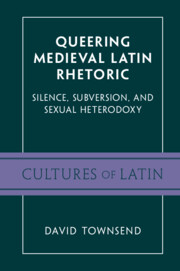Refine search
Actions for selected content:
6 results

Queering Medieval Latin Rhetoric
- Silence, Subversion, and Sexual Heterodoxy
-
- Published online:
- 15 January 2023
- Print publication:
- 05 January 2023
Chapter 1 - Passing over Queerness
-
- Book:
- Queering Medieval Latin Rhetoric
- Published online:
- 15 January 2023
- Print publication:
- 05 January 2023, pp 19-41
-
- Chapter
- Export citation
Chapter 2 - Reticence and Desire in the Devotional Works of Aelred of Rievaulx
-
- Book:
- Queering Medieval Latin Rhetoric
- Published online:
- 15 January 2023
- Print publication:
- 05 January 2023, pp 42-71
-
- Chapter
- Export citation
Chapter 4 - Hiding What Must Be Hidden
-
- Book:
- Queering Medieval Latin Rhetoric
- Published online:
- 15 January 2023
- Print publication:
- 05 January 2023, pp 95-112
-
- Chapter
- Export citation
Introduction
-
- Book:
- Queering Medieval Latin Rhetoric
- Published online:
- 15 January 2023
- Print publication:
- 05 January 2023, pp 1-18
-
- Chapter
- Export citation
Chapter 3 - The Deadly Play of Speech and Silence in Apollonius of Tyre
-
- Book:
- Queering Medieval Latin Rhetoric
- Published online:
- 15 January 2023
- Print publication:
- 05 January 2023, pp 72-94
-
- Chapter
- Export citation
